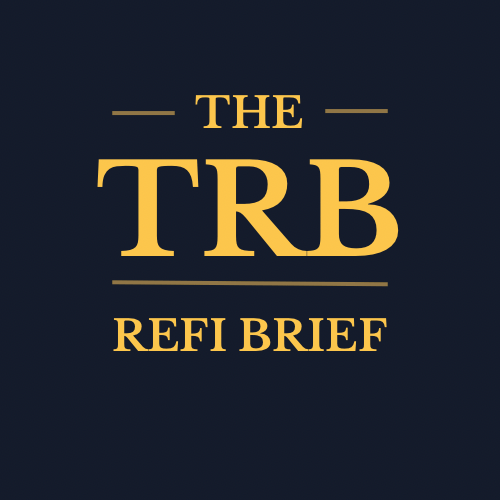
GM. It’s The ReFi Brief on a Saturday. A quick roundup of the most significant global tokenised real estate developments — explained to you in plain English.
In this week’s ReFi Brief:
📘 The Big Read: Propbase paid $25K in hotel yields, but no EU/UK protections.
🏙 Terazo runs $7M tokenised deal in India’s sandbox.
🏢 INVAST launches $100 Dubai real-estate entry.
🌍 Dubai Land Department issues tokenised deeds on XRP
🏡 Asset In Focus: Porta Pamphili, Rome.
🧵 Brief X Signals: 5 signals — regulation, listings, custody.
This week showed the split between receipts and rules. Yields are hitting wallets, but without EU/UK authorisations the safety net is thin.
Think of it like catching a bus without insurance: you might reach your stop, but if it crashes, you’re on your own.
THE BIG READ
Hotel Rooms As Tokens, $100 Entry, 6% Yield — Propbase’s First Payout Explained (P1)
This week I dug into Propbase’s claim that it paid out US$25,000 in rental yields to investors in its Thai hotel tokens.
I think this is one of the first real-world tests of whether tokenized real estate can deliver receipts — not just promises.
Why should you care?
Because saver pain is still sharp. UK savings rates sit around 3%. Inflation runs higher. Even REITs only return 5–7%.
Propbase is dangling 6–7% net rental yields, with minimum entry as low as $100.
That’s squarely aimed at saver-investors like you.
Who is Propbase?
Propbase is a Southeast Asia–focused tokenisation platform built on the Aptos blockchain. It combines four key parts:
• A tokenised property marketplace
• A P2P trading engine with an automated order book
• An in-app custody wallet
• And a public registry of all property transactions
The company is led by Kevin Goos, who has built online property marketplaces across Asia, and Hudson Leung, a finance strategist with 10+ years across the US and Asia .
Their mission is simple: make property investment accessible to everyone, starting at $100.
So What happened?
In mid-2025, Propbase launched four hotel raises in Thailand, each structured through a Limited Liability Company (LLC) and issued as tokens on Aptos.

The minimum ticket was just $100 (about €94), and demand was immediate: all four deals sold out within 40 hours, with Cassia Banyan Tree closing in 30 and Wyndham Queen gone in just 9. That pace alone shows how much appetite there is for this kind of access.
How does the stack work?
The LLC owns the property. The LLC issues tokens.
You buy those tokens using stablecoin (USDT or lzUSD) after passing KYC.
Tokens then sit in an Aptos wallet, tied by smart contract to your slice of rental income.
Think of it like buying a mini-REIT share — but the share lives on a blockchain instead of a stock exchange.
Are the yields real?
Our Crypto Talk published a Propbase Cassia case study showing gross yield of 9.26% and net yield at 6.51%:

And yes, I checked. The $25,000 payout shows on Aptos Explorer. You can’t trace every wallet, but the rails are there. That is the beauty of blockchain - every record is accessible and verifiable.
What about the wrapper?
Each hotel sits inside a Limited Liability Company. Token-holders are written into the Articles via the contract address, making them legal members of the LLC. That means ownership isn’t just symbolic. It’s anchored in company law.
But here’s the snag.
Propbase operates a regulated entity in Thailand. Properties are externally audited before listing. But for EU/UK saver-investors, there are gaps:
• No FCA authorisation in the UK.
• No MiCA/MiFID II licence in the EU.
• No named qualified custodian for securities.
• No regulated MTF/ATS status for its secondary market.
That means you’d be stepping outside the protections you get from a UK REIT or EU fund.
How do you actually join?
1. Open a Propbase account.
2. Pass KYC.
3. Fund an Aptos wallet with USDT/lzUSD (Stablecoins)
4. Buy into the token sale (tiers: Platinum, Elite, Gold, Fair).
5. Tokens vest for one month, then yields start flowing.
It’s smoother than a private real estate syndicate — but far from plug-and-play like a UK ISA.
What’s with the tiers?
Propbase runs a membership system tied to its own token (PROPS). Stake enough, and you unlock early access to sales plus staking APY (they advertise up to 40%).
This is where real estate collides with crypto incentive design. It’s not about the hotel yields anymore — it’s about tokenomics.
That’s something saver-investors should treat carefully.
And the exit?
Propbase advertises 24/7 peer-to-peer trading. Cassia tokens reportedly started trading after vesting. But volumes are opaque. The platform cites ~543k transactions and $3.7m in 24h volume, without breakdown by property.
Liquidity is promised, not yet proven.
So what’s verified and what isn’t?
✔ $25k rental payout happened.
✔ LLC wrapper exists, with token-holders as members.
✔ $100 entry minimum is real.
✖ No EU/UK regulatory permissions.
✖ Liquidity quality unknown.
✖ Long-term yield sustainability untested.
Receipts exist — but only for the first step.
Here’s the saver-investor’s equation.
At £50,000, your expected rental income might be £3,000 a year. That’s better than your savings account — but could be wiped by a 5% swing in Thai baht vs USD. And if no one wants your token when you try to sell, you’re stuck. This is not ISA-safe money. It’s discretionary experiment money.
So is it worth it?
I think Yes, if you are into alternative investing and want to test the rails with a small ticket. No, if you expect regulatory protections, guaranteed liquidity, or stable FX.
It’s like trying a new airline project on a cheap route. You’ll probably land fine. But don’t put your life savings into it.
So access is one thing. Trust is another. The key question now: if the wrapper isn’t EU/UK compliant, is the extra yield worth the regulatory risk?
Here’s where the story gets interesting…

Coffee Chat
What Really Is Tokenized Ownership?
Imagine a legal claim — like a share of rent, debt, or equity — wrapped up as a digital token.
The token itself isn’t the building or the loan. It’s a bridge: your wallet on one side, enforceable contracts on the other.
Behind the scenes, entities like trusts or SPVs keep the official records and make sure income or sale proceeds flow back to token holders.
Because those rights are real, disputes get settled in courts, not just on-chain. That’s why tokens usually come with KYC checks, transfer rules, and audits.
In practice, tokenised ownership makes assets work like stocks: divisible, tradable, and transparent — but still anchored in the same real-world rules that give them value.
Hotel Rooms As Tokens, $100 Entry, 6% Yield — Propbase’s First Payout Explained (P2)
Let’s test what matters most: receipts.
✔ Onboarding? Clear.
✔ Yields? Paid, once.
✖ Liquidity? Promised, not proven.
✖ Regulation? Missing in the EU/UK.
That’s the scorecard.
Why does this matter for EU/UK readers?
Because MiCA is now law. MiFID II and AIFMD cover securities.VAny platform offering property tokens to EU investors should be registering. Propbase hasn’t…..YET. That means if you buy in, you’re outside the FCA/ESMA safety net.
That’s the compliance cliff.
And yet, the demand is real. Four raises sold out in hours. Retail appetite for fractional hotels exists. The genie is out of the bottle. The only question is whether regulators catch up — or clamp down.
The verdict
Propbase has delivered receipts on yield. It has not delivered receipts on liquidity or compliance. That makes it a “small-ticket, monitor closely” play for EU/UK saver-investors. Not a core holding.
I have reached out to Propbase to hear if Europe is on their compliance roadmap. I like Thailand and the wider region as an attractive entry to luxury properties.
Final takeaway
Tokenized real estate is crossing the line from hype to reality. But trust is not built on promises. It’s built on payouts, disclosures, and compliance stamps.
Propbase has passed step one. Steps two and three are still ahead.
THE WEEK IN BRIEF
Regulatory & Legal

Aniruddh Jhaveri, Akash Zaveri, Reva Mehta, Shaan Zaveri, Susan Mathew, Gaurav Gadhecha, Amar Chokshi
Image Source: terazo.network
The Brief: Terazo, with Tokeny, launched Oryx — India’s first regulated real-estate tokenisation inside the IFSCA sandbox at GIFT City.
The Details:
$7M of a $48M commercial tower tokenised.
Minimum $100k primary, $1k secondary.
ERC-3643 tokens automate KYC and whitelist transfers.
Structure: Alternative Investment Fund, not direct property title.
What This Means: For EU saver-investors, it’s a “beta test” of regulated cross-border access. But minimums are high, liquidity unproven, and yields unknown. Think of it as a sandbox REIT share — promising, but not ISA-ready.
PLATFORM & INFRASTRUCTURE

Image Source: Arabianbusiness.com
The Brief: INVAST now lets investors buy Dubai property tokens from $100, with promised monthly rental payouts.
The Details:
DLD certificates claim to back ownership.
VARA compliance is implied, but licences undisclosed.
No proof of payouts or secondary liquidity yet.
What This Means: Access looks great, but evidence is thin. Until audits or regulator approvals appear, treat this like a glossy brochure — tempting, but not MiCA/FCA-proof.
Regulatory & Legal

Image Source: Ripple
The Brief: Dubai Land Department, Ripple, and Ctrl Alt have issued tokenised property title deeds on XRPL.
The Details:
First government-led deed tokenisation in the Middle East.
Uses DFSA-approved RLUSD stablecoin, custodied by BNY Mellon.
Aims for fractional ownership, anchored to public registry.
What This Means: This is infrastructure, not retail product — yet. For EU investors it’s like the move from paper to electronic land registries: no yield today, but a regulatory foundation for cross-border property tokens tomorrow
ASSET IN FOCUS
Rome is preparing for its 2025 Jubilee year, with 30m+ pilgrims expected and rental demand soaring. Into this backdrop, MetaWealth is tokenising 15 new units at Porta Pamphili.
Investors can join from ~$100 (~€94), funding construction in exchange for fixed coupons plus a share of exit profit.
Asset Snapshot:
💵 Yield/Income: 5% p.a. fixed coupon + profit share (27% target over 18 months).
🔑 Access: ~$100 minimum via mobile onboarding.
⚖ Compliance: Lithuanian VASP licence; wrapper clarity (security vs non-security) still mixed.
Why it’s interesting
Rome rents are rising (+3.9% YoY) with tight supply.
Jubilee-year demand may buoy sales.
Secondary exits expected under VASP, but track record limited.
Risks to note
Exit-dependent returns; only 5% fixed is guaranteed.
• Wrapper ambiguity leaves investor rights unclear.
Financial Disclaimer: This Asset Assessment is for informational/educational purposes only and does not constitute investment or financial advice. All data is based on publicly available listings. Readers must register directly with the platforms listed here to view full offering documents. Always do your own research (DYOR) before investing.
BRIEF X SIGNALS
🔗 Mirae Asset + Ava Labs partner on Avalanche — could funnel tokenised funds (incl. property) into EU portfolios with compliant rails.
🔗 DLA Piper flags Nasdaq + MiCA convergence — tokenised REITs could trade with clear EU rules.
🔗 Kraken lists $PRO token — first property-linked asset with institutional exchange liquidity in the EU.
🔗 Thailand SEC expands token rules — fractional tickets (~€500) available under retail-safe oversight.
🔗 Analyst notes most token deals fail when Data, Legal, and Distribution don’t align — a checklist EU investors should demand.
^
See you in the next brief,
Tatenda

